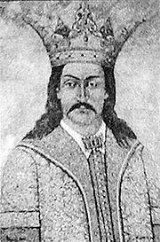
Vladislav I of Wallachia
Encyclopedia
Vladislav I of the Basarab dynasty, also known as Vlaicu-Vodă, was a ruler of the principality
of Wallachia
(an area in modern-day Romania
) (1364 – c. 1377). He was a vassal of the Bulgarian Emperor Ivan Alexander
. In 1369 Vladislav I subdued Vidin and recognised Louis I of Hungary as his overlord in return for Severin, Amlaş, and Făgăraş. In 1373 Louis I took Severin again but the Vlachs recovered it in 1376–1377.
Vladislav
is the name derived from the old Slavic origin, meaning "to rule with glory" from slavic волод volod (rule) and слав slav (glory).
Principality
A principality is a monarchical feudatory or sovereign state, ruled or reigned over by a monarch with the title of prince or princess, or by a monarch with another title within the generic use of the term prince....
of Wallachia
Wallachia
Wallachia or Walachia is a historical and geographical region of Romania. It is situated north of the Danube and south of the Southern Carpathians...
(an area in modern-day Romania
Romania
Romania is a country located at the crossroads of Central and Southeastern Europe, on the Lower Danube, within and outside the Carpathian arch, bordering on the Black Sea...
) (1364 – c. 1377). He was a vassal of the Bulgarian Emperor Ivan Alexander
Ivan Alexander of Bulgaria
Ivan Alexander , also known as John Alexander, ruled as Emperor of Bulgaria from 1331 to 1371, during the Second Bulgarian Empire. The date of his birth is unknown. He died on February 17, 1371. The long reign of Ivan Alexander is considered a transitional period in Bulgarian medieval history...
. In 1369 Vladislav I subdued Vidin and recognised Louis I of Hungary as his overlord in return for Severin, Amlaş, and Făgăraş. In 1373 Louis I took Severin again but the Vlachs recovered it in 1376–1377.
Vladislav
Vladislav
Vladislav is a Slavic male given name, sometimes confused with/treated as the same as Ladislav...
is the name derived from the old Slavic origin, meaning "to rule with glory" from slavic волод volod (rule) and слав slav (glory).

